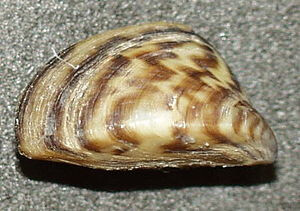As long as I’m reading near a computer, I guess I can be compiling a mini sea-creature encyclopedia as I read. I think it will be interesting to refer back to.
Sea creatures auf Deutsch
Zebramuschel (auch Wandermuschel)

The zebra mussel (Dreissena polymorpha) is a small freshwater mussel. The species originates from the lakes of southern Russia and Ukraine, but has been accidentally introduced to numerous other areas and has become an invasive species in many countries worldwide. (from Wikipedia)
Tintenfisch
Coleoidea or Dibranchiata is one of the two subclasses of cephalopods containing all the various taxa popularly thought of as “soft-bodied” or “shell-less” (i.e. octopus, squid and cuttlefish). (from Wikipedia)
Dinoflagellaten

The dinoflagellates (from Ancient Greek δῖνος (dînos) ‘whirling’ and Latin flagellum ‘whip, scourge’) are a monophyletic group of single-celled eukaryotes constituting the phylum Dinoflagellata and are usually considered protists. Dinoflagellates are mostly marine plankton, but they also are common in freshwater habitats. Their populations vary with sea surface temperature, salinity, and depth. Many dinoflagellates are photosynthetic, but a large fraction of these are in fact mixotrophic, combining photosynthesis with ingestion of prey (phagotrophy and myzocytosis).(from Wikipedia)
Bartenwal

Baleen whales, or whalebone whales
Buckelwal

Humpback whale
Tümmler
porpoises
Delphine
dolphins
Robbe
seal
Qualle
jellyfish
Seewespe

Chironex fleckeri, commonly known as the Australian box jelly, and nicknamed the sea wasp, is a species of extremely venomous box jellyfish found in coastal waters from northern Australia and New Guinea to Indonesia, Cambodia, Malaysia and Singapore, the Philippines and Vietnam. It has been described as “the most lethal jellyfish in the world”, with at least 64 known deaths in Australia from 1884 to 2021. (from Wikipedia)
Portugiesische Galeere

Portuguese man o’ war. Although it superficially resembles a jellyfish, the Portuguese man o’ war is in fact a siphonophore (Staatsquelle). Like all siphonophores, it is a colonial organism, made up of many smaller units called zooids. Although they are morphologically quite different, all of the zooids in a single specimen are genetically identical. These different types of zooids fulfil specialized functions such as hunting, digestion and reproduction, and together they allow the colony to operate as a single individual. (from Wikipedia)
Segelqualle

Velella is a monospecific genus of hydrozoa in the Porpitidae family. Its only known species is Velella velella, a cosmopolitan (widely distributed) free-floating hydrozoan that lives on the surface of the open ocean. It is commonly known by the names sea raft, by-the-wind sailor, purple sail, little sail, or simply Velella.
Related vocabulary:
Fluke: die Schwanzflosse der Wale sowie der Seekühe. Im Gegensatz zur Schwanzflosse der Fische ist die Fluke dieser Meeressäuger horizontal zum Körper ausgerichtet und wird nur von Bindegewebe in Form gehalten, enthält also keine Knochen. Die Wirbelsäule endet im Flukenstiel.
Geißel: flagellum (long thin extension used for movement)
Heck (das): stern (back) of a ship
Rumpf (der): hull of a ship
![]() But I’m sure I’ll have questions soon, no worries.
But I’m sure I’ll have questions soon, no worries.







